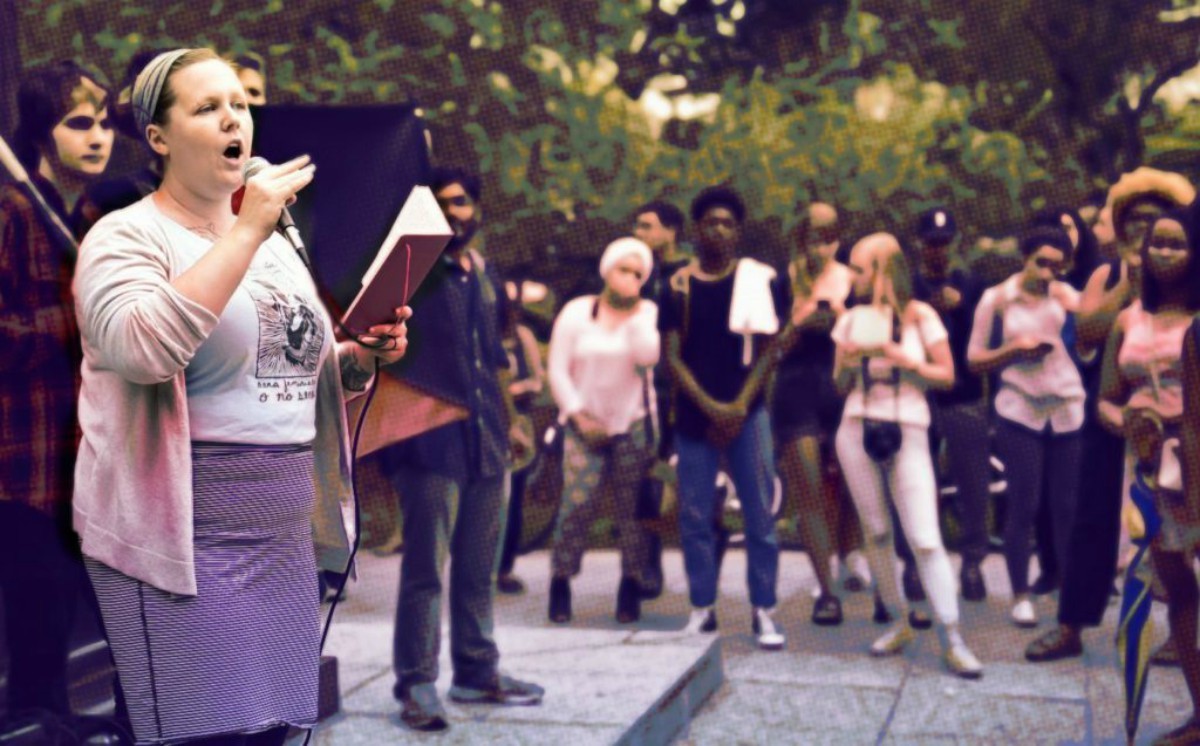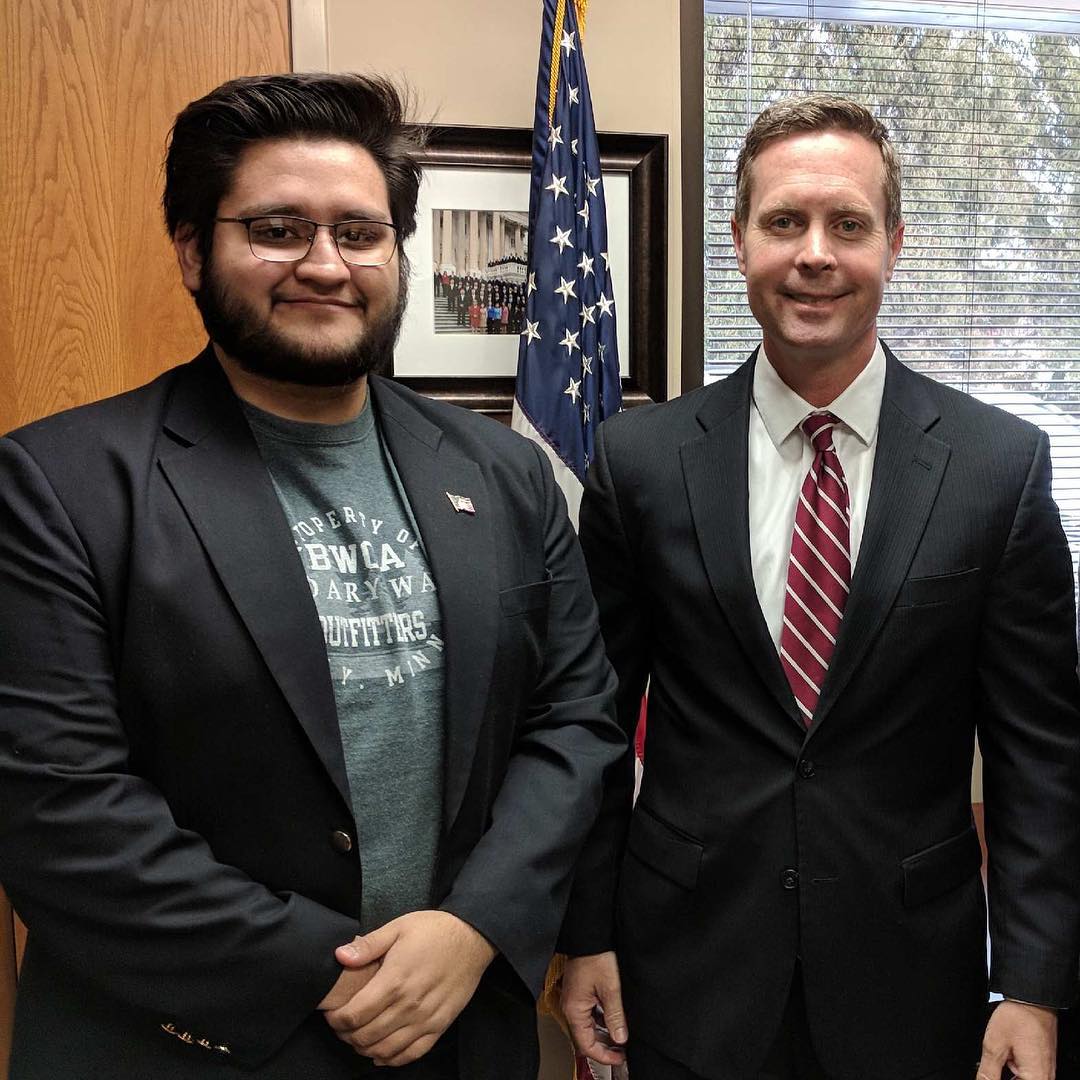Filed under: Anarchist Movement, Anti-fascist, Education, Interviews, US

Kristina Khan is an organizer with Black Rose/Rosa Negra, a mother of three married to Tariq Khan, and the primary author of “Campus Fascism: Turning Point USA and It’s Links to the Far-Right.” To listen to our podcast interview with Tariq, go here.
David Prochaska: Talk about Turning Point USA (TPUSA).
Kristina Khan: It’s important to make a distinction between the wealthy donors and between the different student members, because there are plenty of students across the country involved with TPUSA that absolutely believe that it just stands for things like free markets. Some members are so young, and they really think that it’s this cool version of conservativism, which is the point: that’s what TPUSA wants.
So, you do have some students that I wouldn’t lump in with the alt-right. But then you have students that are paid staff, getting training on how to sue the university, getting training on how to go right up to the line of what is illegal but without breaking the law, training in harassing and stalking people, how to push Zionist propaganda and vilify Muslims. And the training is open to kids as young as fifteen.
Then you have people, the higher-ups, that definitely have agendas, and who I would consider neo-fascist, and you also have the kids in the street like “Proud Boys,” who are very much neo-fascist, beyond alt-right, very neo-fascist. Traditionalist Workers Party, which identifies itself as fascist, Vanguard America—these are all really young men, too. But they’re more willing to be violent.
TP USA “Tokenizing”
DP: What do you mean by “tokenizing”?
KK: By tokenizing I mean TPUSA using the few members of color that they do have, and propping them up as mouthpieces for the organization. Their whole strategy is to not look like they’re affiliated with the alt-right or hardcore white supremacists. So they don’t want to miss any opportunity to showcase what little diversity they have.

Joel Valdez (left) appears on far-right commentator Gavin McInnes’ show (right), November 21, 2017, talking about Valdez’s confrontation with Tariq Khan on November 16. McInnes founded the “Proud Boys,” an alt-right “pro-Western fraternal organization” for men.
It’s hard to tell how wedded one is to an ideology at such a young age. If I’m honest, I could see there being political development as you get older, and less impulsive, and more aware of consequences. But there is strong evidence now, it’s been reported that there’s actually a large number of Latinos, in particular, that are in the “Proud Boys” sharing Islamophobic, anti-Semitic and anti-Black views. There is also support by the Hispanics-for-Trump coalition for the local TPUSA group, so there’s a connection there as well.
DP: What about gender? Identity politics?
KK: What’s really interesting to me is that when a TPUSA member, who is a student, is running in a student election, it is a very different approach than when they’re tabling on the Quad, or doing a free speech event, or an “affirmative action” bake sale. They’re much tamer, and for a lot of them, it turns out, part of their campaign is to address sexual harassment! Which is super-interesting to me. This is intentional, as if “we care about diversity.”
When I found out that most of them have the same sort of election platform, it’s just to get people in. And their campaign funding from TPUSA helps, too. But it’s very different from their actual practices.
Gender and Diversity
For example, the president of the local TPUSA is a woman. But I’ve never seen any of the women – and there are multiple female members of Turning Point USA – show up to do the filming, or the stalking. So when you look up our chapter you would think that it’s all women and run by women, but it’s not. I mean, these guys are absolutely making the narrative, taking control, making decisions, doing the paid reporting for Campus Reform.
It goes back to the point I was making about tokenizing. If you can put on display all your women, all your people of color, all your gay kids, then you look like you’re not an alt-right organization, and you look like you’re not associated with any kind of “despicable, deplorable” people.

Facebook post, November 21, 2017. Tariq Khan (right) and Joel Valdez (left) at November 16 confrontation. A respondent offers to attack Khan, “I’ll beat his ass for you bro,” to which Valdez replies, “Do it ASAP.”
Same with diversity, which we also see in the Office of Student Conflict Resolution (OSCR) and the Office of Diversity, Equity and Access (ODEA). “Look at all this diversity,” but is it really making impactful changes on the ground? It doesn’t look like it, but it is definitely – and I’ve talked to some people about this, too – so manipulative. It’s using people, and while at the same time criticizing stuff like identity politics – which I’ll be critical of, too – the irony of that is just amazing to me, because what you’re doing, you’re taking people based on their identity, and saying, okay, let’s preview about how to speak to the media, because this looks really good. It’s a publicity game, absolutely.
DP: What about responses, about community self-defense as an option?
KK: I actually think that community self-defense is our only option in a lot of ways. For a lot of people, people of color and black people in particular, there are no other options. As people start realizing that, oh, I’m going through the proper channels for dealing with these threats. I went to the University to file a report, I called the police over and over and over again, and nothing happened. Or we’re still being stalked, or we’re still dealing with these threats on campus, or in the community.
So, one example of putting this into practice was myself, Tariq [Khan] and some other community members called for a community strategy session. We tried to get as many people representing as many different groups on and off campus as we could, from student activists to women in ministry to staff at the university. We were able to identify threats to the community and brainstorm a variety of responses and solutions.
I think what’s really important for people to know about community self-defense is that there’s a long tradition from marginalized communities that we can look to for examples. It also differs from town to town based on what our needs are, and can involve a wide range of people and tactics.
Backlash Occurring?
DP: Nonetheless, you see a backlash beginning to occur?
KK: TPUSA, I think, has pushed too far. I think they’re now beyond alt-lite and more into alt-right territory. Or people are seeing them that way, which is fantastic. Before they started to get media coverage about their relationships with this more extreme alt-right, they would say, “No, we’re the good kind of conservatives, we’re not these crazy alt-right people.” But I don’t think that’s working for them anymore.
I thought, and some people that I had talked to sort of predicted that this was going to happen. I’m surprised it’s happening sooner rather than later, because the TPUSA kids are really aggressive, because they’re being promised careers, and they’re going all in. Yet despite the training, now it’s kind of imploding. And I want it to keep imploding.
For more on TP USA and their campaign of harassment against visible left-wing activists on campus we recommend “Campus Fascism: Turning Point USA and It’s Links to the Far-Right” by Kristina Khan.






